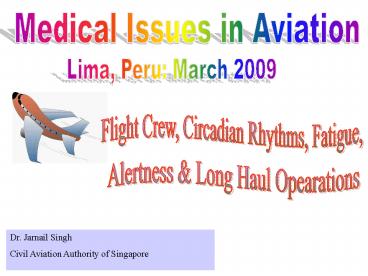Medical Issues in Aviation - PowerPoint PPT Presentation
1 / 57
Title:
Medical Issues in Aviation
Description:
NOT a good example of a person with reserves and spare mental capacity. In the ... Opportunity for pre-flight rest/sleep. Opportunity for in-flight rest/sleep ... – PowerPoint PPT presentation
Number of Views:34
Avg rating:3.0/5.0
Title: Medical Issues in Aviation
1
Medical Issues in Aviation
Lima, Peru March 2009
Flight Crew, Circadian Rhythms, Fatigue,
Alertness Long Haul Opearations
Dr. Jarnail Singh Civil Aviation Authority of
Singapore
2
- Fatigue and alertness
- Rest and sleep
- Time since awake
- Type of activity
- Time on task
- Type of task
- Circadian rhythm
- Drugs/Medication/Aids to alertness
- Manual
- Mental
- Monotony/Boredom
- Challenging
3
Measuring Fatigue
Fatigued Get Out
Wouldn't it be nice?
Fatigue Meter
ALERT
BUSHED
4
Can Fatigue be measured?
Physical Yes
Mental No
Research Ongoing -- US Navy Studies
Alcohol Equivalence Caution!!! In Using Such
measures
Surrogate Measures eg. Karolinska / Stanford
Scales
Concept of AVOIDANCE of Fatigue
5
Can Alertness Be Measured?
Sleep Vs Wakefulness -- EEG (Polysomnography)
- Psychomotor Vigilance Tests
- Simple Reaction Time
- Choice Reaction Time
- Tracking Tasks
- etc
Performance Based Measures LOSA, FOQA etc
6
(No Transcript)
7
(No Transcript)
8
(No Transcript)
9
Yerkes-Dodson Curve
OPTIMUM
Acceptable
GOOD
Performance
POOR
POOR
LOW
HIGH
Arousal Stress Workload etc.
10
Yerkes-Dodson Curve
Acceptable
Performance
GOOD
Arousal Stress Workload etc.
11
Yerkes-Dodson Curve
Shift to the Right
OPTIMUM
Well Rested
GOOD
Good Sleep
Good Handle on Life Stressors Etc..
Acceptable
Performance
POOR
POOR
LOW
HIGH
Arousal Stress Workload etc.
12
Yerkes-Dodson Curve
Shift to the Left
- Not Slept Well
- Not Well Rested
- Circadian Desynchrony Not Managed
- Work Overload
- Excess Alcohol
OPTIMUM
GOOD
Acceptable
Performance
POOR
POOR
LOW
HIGH
Arousal Stress Workload etc.
13
General Idea
Build up reserves
Spare mental capacity
14
NOT a good example of a person with reserves and
spare mental capacity
15
In the Aviation World
Rest Sleep
Circadian Desynchrony
?
16
Time Since Awake
Sleep
Awake
In - Between
Take - Off
0800
2000
17
Yerkes-Dodson Curve
Which Side of the Curve are you on?
- Right
OPTIMUM
GOOD
Acceptable
Performance
- Left
POOR
POOR
LOW
HIGH
Arousal Stress Workload etc.
18
TYPE OF ACTIVITY
Vs
PHYSICAL
MENTAL
19
Time On Task
Remember Yerkes-Dodson!
Type Of Task
Cockpit Environment
20
Flight Time Limits...
.... in Aviation
21
A
22
B
23
- Factors that moderate alertness/fatigue on the
flight deck - Number of flight crew
- Composition of flight crew
- Status of circadian acclimatization
- Previous duty duration
- Opportunity for pre-flight rest/sleep
- Opportunity for in-flight rest/sleep
- Post-flight recovery and sleep
24
Ultra Long Range Flights
What were the issues to be resolved?
25
(No Transcript)
26
(No Transcript)
27
B
28
(No Transcript)
29
Lessons From ULR Studies
30
Departure windows that factor in circadian shifts
and a systematically thought out plan for
rest/sleep in the overall duty cycle, alongside
appropriate crewing, are the key to maintaining
alertness.
31
Aids To Sleep Alertness
32
Alertness
Sleep zzzzzzzzzz
Relaxation
33
Aids to Alertness
COFFEE
34
Time of Consumption and Amount Consumed are
Important
Coffee
Within the Duty / Rest Cycle
35
Sleeping Aids
What a coincidence, so does he
36
Melatonin
Hormone produced mainly in Pineal gland Regulates
circadian rhythm in the normal dark/light cycle
?Assist in jet-lag Should a pilot use it? When to
use it
37
Hypnotics.....Zzzzzzzzzzzz
What are they?
Dose
Tranquility
Sleep
Death
Unconscious
Pilots ---- ? Take Hypnotics
38
What about Alcohol?
39
NOT a good
Sleeping aid !
40
Sleep Hygiene...zzzzzzzz
Humans (like all animals) are creatures of
habit Establish sleep habits --- follow the
routine
Healthy Life Style Essential
Moderation is the key
41
Sleep structure across the ages
42
The Bedroom.....
HOTEL
HOME
.... for sleep only
..... For Sleep Only
43
OK, Provided You
Get Some Sleep As Well !!
44
Definitely Not Recommended
45
Zeitgerbers
Entrain the Circadian clock
eg. Light vs Dark
46
(No Transcript)
47
(No Transcript)
48
(No Transcript)
49
(No Transcript)
50
(No Transcript)
51
(No Transcript)
52
(No Transcript)
53
Hygiene Factors ?
Up to a limit
54
"Avoidance" of Fatigue
CAP 371
We know the factors leading to fatigue.
Fatigue is difficult to quantify
Cut-off points for fatigue cannot be determined
Avoidance of Fatigue Factors is the BEST Bet
55
Proponents of
Fatigue Risk Management
Are Saying The Same Thing
It Is Just Packaged Differently
56
Summary
- Fatigue remains a problem among pilots
- Regulators, Pilots and Airline Operators all have
a part to play - Current regulations (FTLs) require revision
- Definitions within the regulations need to be
crafted/refined to remove ambiguity (of
interpretation) - Overarching prescriptive limits likely to remain
- Fatigue Risk Management will come in within the
ambit of the overarching prescriptive limits
57
(No Transcript)

